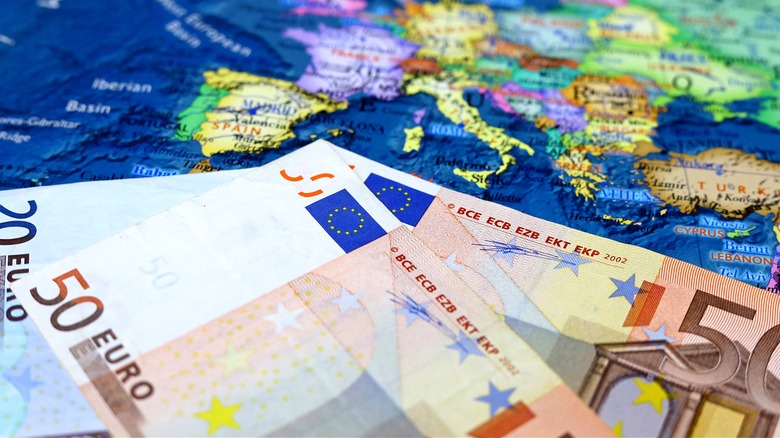You've Been Warned: This Convenient Money Habit Will Cost You While Traveling Abroad
When you're traveling abroad in an unfamiliar place, it can be comforting to find businesses that accept good ol' U.S. dollars. After all, there's no need to figure out the conversion rate in your head or break out your smartphone's calculator app. You'll save the hassle of navigating an unfamiliar ATM as well, or potentially paying foreign transaction fees. This said, that undeniable convenience of using U.S. dollars to buy a meal or souvenir in a foreign country is a major money mistake when traveling abroad. That's because the shop or cafe owner is effectively exchanging money for you. And you can rest assured that the arbitrary conversion rate is not going to be an attractive one.
Just like currency-exchange kiosks at airports should be avoided when you're considering the best places to exchange currency before your next trip, so too should cleverly disguised exchanges and/or currency conversion offered by vendors. Per NerdWallet, airport exchanges can charge travelers at rates 14% or higher than the current exchange rate set by the International Monetary Fund. Speaking to The Wall Street Journal, tourist finance advocate Janek Rubeš said to only resort to airport kiosks "if you're desperate to get cash." That statement can surely be expanded to include restaurants and shops that are willing to accept U.S. dollars.
Paying in euros can be as bad as paying in dollars
Another conundrum you may face as a traveler, particularly if hopping around Europe, is if you've already obtained euros, but visit a country which doesn't use the euro as its currency. For example, you're exercising your Eurail pass and traveling from France or Germany to Switzerland, Hungary, Poland, Romania, or a few other countries that have their own unique currencies. While many shops, restaurants, and taxis in those countries will accept payment in euros, you'll end up paying for the convenience for sure.
Similar to the situation with vendors accepting American dollars, you may be able to pay in euros and the local currency. In more touristy areas, prices may even be listed in euros right alongside the local currency price. However, the same caution applies as when paying with American dollars: the undisclosed exchange rate (aka conversion rate) from euros to local currency is likely to be quite poor.
If you're only visiting a country for a very short time, then it might be okay not to withdraw local currency. In areas that cater to foreigners, you can use currencies other than the local one for small transactions that might not accept credit cards. For example, a gratuity to a hotel employee helping you with luggage or buying a bottle of drinking water from a newsstand. But for longer stays, and depending on how widely credit cards are accepted, you'll want to head to an ATM to withdraw at least some amount of local currency.
Use a no-fee credit card when possible
Much of the hazard of not paying for purchases in local currency when traveling can be avoided by using a credit card for as many transactions as possible. Ideally, you will want to identify one of your current credit cards that doesn't charge a foreign transaction fee — one of many little-known perks of travel-oriented credit cards — or else sign up for a new card with this particular benefit before your next big trip. Foreign transaction fees can range from 1% to 3% of the transaction value, which can really add up over the course of a long vacation.
If you do decide you're going to need some local currency to supplement your credit card(s), note that using a foreign ATM is likely to also carry a foreign transaction fee. This fee could be either a percentage of the withdrawal amount or a fixed amount, like $5 per transaction. It's not too difficult to find credit cards with no foreign transaction fees, but it's tougher to find banks that don't charge this fee for ATM withdrawals. And, typically, if a bank doesn't charge this fee, there will be other strings attached to the account, such as maintaining a high minimum balance or paying a monthly service fee.
In any case, verify that your bank's fee for foreign ATM withdrawals isn't too outrageous. Also, decline the option to have the withdrawal converted into your home currency when using a foreign ATM because the conversion rate will be awful – a recurring caveat when traveling abroad.


